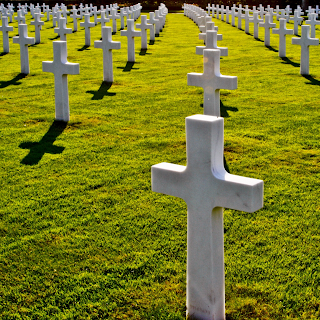Dulce et Decorum Est by Wilfred Owen - A Brief Examination
ABOUT THE POET
Wilfred Owen (1893-1918) had first hand experience with the the trauma associated with war. As a result, he wrote a number of poems based on his own experiences and those he witnessed. Owen would have suffered shell shock and eventually died on the battlefield of World War 1 at the young age of 25.
THE POEM
The poem 'Dulce Et Decorum Est' was one of the many poems he wrote to dispel the notion that sending soldiers to fight in a war was a glorious experience. He calls it an 'old lie' which is fed to soldiers to give them a sense of ease and encourage patriotism as they embrace the idea of sacrificing their lives for their country. The reality is quite different as many soldiers either die or are left physically and mentally damaged.
Owen does not hold back in his presentation of the horrors of war. He employs graphic language to portray the discomfort, despair and death.
By the end of the poem, readers are left reeling by the devastating realities of the battlefield, especially during a gas attack.
Stanza 1: Details are given about the soldiers as they head back to camp - 'distant rest'. The reader learns that the soldiers are bent over 'like old beggars under sacks', 'coughing like hags' and feeling tired. Some have even lost their boots but continue to limp on feet that are quite bloody. Although gas bombs (Five-Nines) are falling, they are too exhausted to hear or even pay attention to them. This stanza captures how physically devastated these soldiers are by their involvement in the war.
Stanza 2: This stanza focuses on the frantic efforts of the soldiers to put on their helmets in the midst of a gas attack. Unfortunately, one soldier fails to put on his helmet in time and dies a horrible death.
Stanza 3: Having witnessed the horrible way in which another soldier died, the speaker is haunted by this in his dreams. He constantly remembers how the man dies while he was only able to watch him in helpless horror.
Stanza 4: Owen speaks directly to advocates of war. If they only dreamt or experienced how horrible warfare is they would stop promoting the enlistment in a war as a good thing because this is all a lie. He makes several references to the manner in which the soldier died to reinforce the trauma of war. For example, he uses phrases like: 'white eyes writhing in his face', 'like a devil sick of sin', 'froth-corrupted lungs'.
He seeks to show that that there is no glory. Instead, trench warfare is traumatizing and gory.
Setting: battlefield, World War 1
Tone: ironic, bitter, angry
Themes: patriotism, appearance versus reality, effects of war
Literary Devices:
- simile: 'bent double, like old beggars under sacks', 'coughing like hags', floundering like a man in fire or lime'
- metaphor: 'drunk with fatigue'
- imagery: Note expressions like ''coughing like old hags', 'Bent double like beggars under sacks', 'an ecstasy of fumbling', 'guttering, choking', 'blood come gargling' and several others.
- alliteration: 'sick of sin, 'watch the white eyes writhing in his face'
- repetition: 'Gas! Gas! Note also the repetition of the word 'if' in the final stanza.
- irony: Soldiers are told that it is a good thing to die for their country, but the reality of war is quite the opposite. The horrible way in which soldiers have to die on the battlefield belies the glory-filled idea of dying for one's country.
As you read the poem, pay attention to the words(diction) that are used by Owen to convey how physically and mentally devastating warfare is on soldiers. He aims to evoke horror, anger and pity from those who read it. It is designed to open our eyes and force us to question the value of war.
Study Hub for CXC English A & B
Follow us on Facebook and Instagram




Comments
Post a Comment